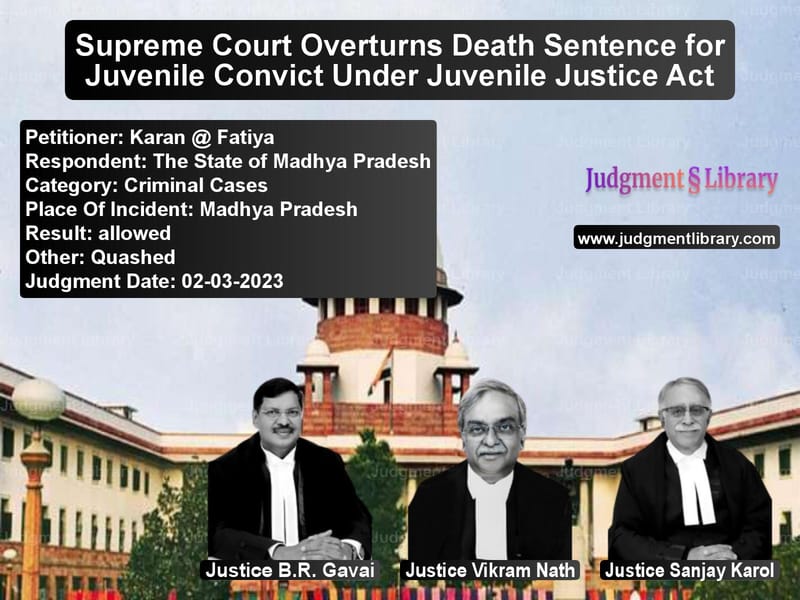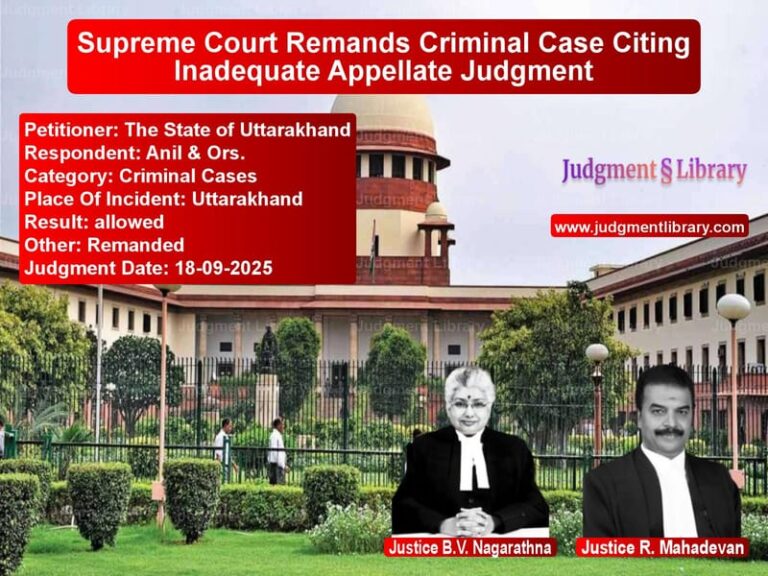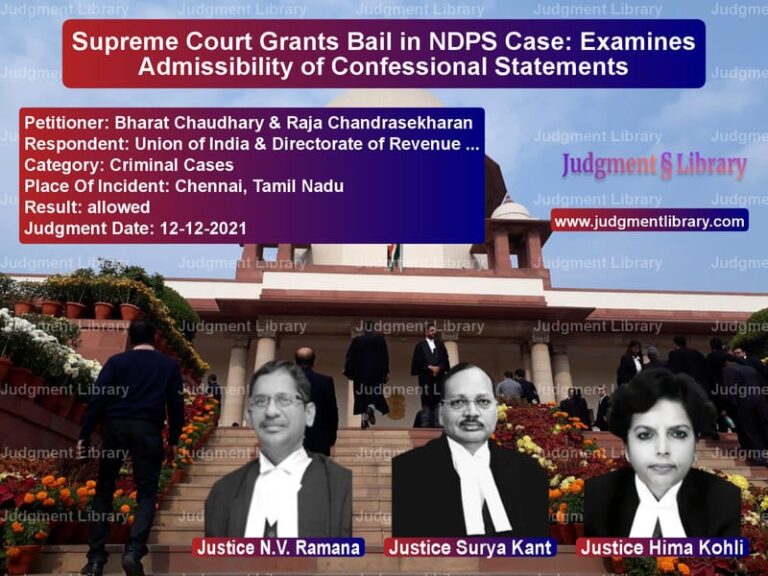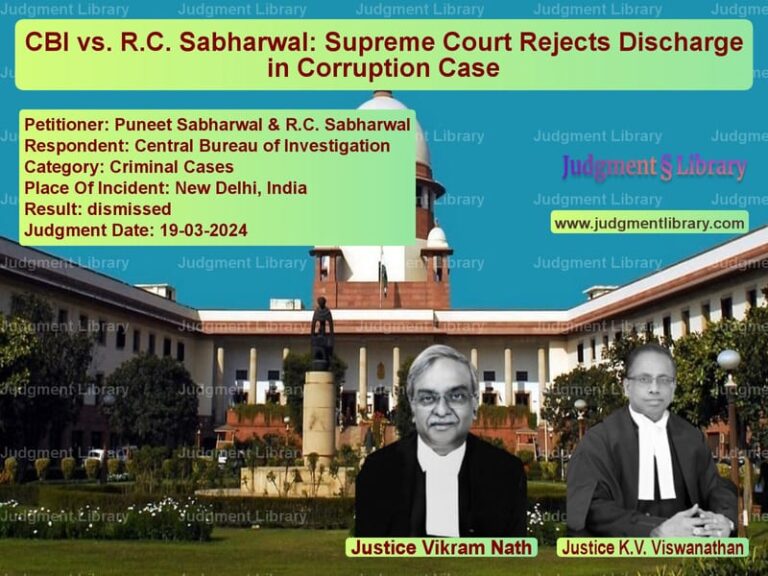Supreme Court Overturns Death Sentence for Juvenile Convict Under Juvenile Justice Act
The Supreme Court of India recently ruled in Karan @ Fatiya v. The State of Madhya Pradesh, overturning the death sentence of the appellant upon determining that he was a juvenile at the time of the offense. This landmark judgment emphasizes the importance of correctly establishing the age of an accused and applying the provisions of the Juvenile Justice (Care and Protection of Children) Act, 2015 (JJ Act).
Background of the Case
The case involved the brutal rape and murder of a minor girl. The appellant was convicted under:
- Section 363 IPC (Kidnapping)
- Section 376(2)(i) IPC (Rape of a minor)
- Sections 5(m)/6 of the POCSO Act (Aggravated penetrative sexual assault)
- Section 302 IPC (Murder)
- Section 201 IPC (Causing disappearance of evidence)
The Trial Court sentenced the appellant to death on May 17, 2018, stating that the case fell under the ‘rarest of the rare’ category. The Madhya Pradesh High Court upheld this ruling on November 15, 2018. However, during the Supreme Court appeal, the appellant claimed he was a juvenile at the time of the offense.
Key Legal Issues
The primary legal issue before the Supreme Court was whether the appellant was a juvenile under the JJ Act, which provides special protection to offenders below 18 years of age.
Petitioner’s Arguments (Karan @ Fatiya)
The appellant, represented by Senior Advocate Sidharth Luthra, contended:
- His date of birth was July 25, 2002, making him 15 years, 4 months, and 20 days old on the date of the offense (December 15, 2017).
- Under Section 9(2) of the Juvenile Justice Act, he could not be awarded the death sentence.
- Section 18 of the Juvenile Justice Act prescribes a maximum sentence of three years in a juvenile home for heinous offenses committed by juveniles under 16.
- He had already spent over five years in custody and should be released immediately.
- The prosecution failed to challenge the authenticity of his birth records during trial proceedings.
Respondent’s Arguments (State of Madhya Pradesh)
The State of Madhya Pradesh, represented by Advocate General Pushpendra Kaurav, opposed the plea, arguing:
- The documents presented by the appellant to prove his date of birth were unreliable.
- The Court should order an ossification test to determine his true age.
- The crime was exceptionally heinous, and the accused should not be shielded by technicalities.
- The appellant displayed adult-like conduct and should not be given the benefit of juvenile provisions.
Supreme Court’s Analysis and Judgment
The Supreme Court, comprising Justices B.R. Gavai, Vikram Nath, and Sanjay Karol, ruled in favor of the appellant and set aside his death sentence.
“It is found conclusively proved that the date of birth of the appellant is 25.07.2002. Taking into account this date, he was 15 years, 4 months, and 20 days old on 15.12.2017, and being below 16 years of age, he was a child as per Section 2(12) of the Juvenile Justice Act.”
The Court rejected the prosecution’s demand for an ossification test, reasoning:
- The appellant’s birth certificate from a government primary school was accepted as conclusive proof.
- Multiple teachers and school administrators confirmed the date of birth.
- Ossification tests provide only an estimated age range, whereas official documents offer precise birth dates.
Legal Precedents Considered
The Court relied on several previous rulings, including:
- Kalu @ Amit v. State of Haryana (2012) 10 SCC 34 – Established that documentary evidence regarding age should be given primacy over medical tests.
- Pratap Singh v. State of Jharkhand (2005) 3 SCC 551 – Clarified the procedure for age determination under the Juvenile Justice Act.
- Raju v. State of Haryana (2019) 8 SCC 111 – Held that an individual’s claim of juvenility can be raised at any stage of proceedings.
Key Takeaways from the Judgment
For Juvenile Offenders:
- A person can claim juvenility at any stage, including after conviction.
- Juveniles under 16 cannot be sentenced to life imprisonment or the death penalty.
- The Juvenile Justice Act must be interpreted liberally to prevent wrongful punishment.
For the Judiciary:
- Courts must verify birth records before ordering ossification tests.
- Convictions of juveniles must comply with the Juvenile Justice Act’s sentencing guidelines.
For Law Enforcement:
- Police must ensure that age verification is conducted at the time of arrest.
- Failure to recognize a juvenile status can lead to wrongful sentencing.
Conclusion
The Supreme Court’s decision in Karan @ Fatiya v. The State of Madhya Pradesh underscores the importance of protecting juvenile rights. By overturning the death sentence, the Court reaffirmed the principle that juveniles must be treated differently from adult offenders.
This ruling sets a critical precedent for ensuring that juveniles are not wrongfully subjected to severe punishments that conflict with the protective framework of the Juvenile Justice Act. It also reiterates the judiciary’s commitment to upholding constitutional protections for children in conflict with the law.
Petitioner Name: Karan @ Fatiya.Respondent Name: The State of Madhya Pradesh.Judgment By: Justice B.R. Gavai, Justice Vikram Nath, Justice Sanjay Karol.Place Of Incident: Madhya Pradesh.Judgment Date: 02-03-2023.
Don’t miss out on the full details! Download the complete judgment in PDF format below and gain valuable insights instantly!
Download Judgment: karan-@-fatiya-vs-the-state-of-madhya-supreme-court-of-india-judgment-dated-02-03-2023.pdf
Directly Download Judgment: Directly download this Judgment
See all petitions in Murder Cases
See all petitions in Juvenile Justice
See all petitions in Bail and Anticipatory Bail
See all petitions in Judgment by B R Gavai
See all petitions in Judgment by Vikram Nath
See all petitions in Judgment by Sanjay Karol
See all petitions in allowed
See all petitions in Quashed
See all petitions in supreme court of India judgments March 2023
See all petitions in 2023 judgments
See all posts in Criminal Cases Category
See all allowed petitions in Criminal Cases Category
See all Dismissed petitions in Criminal Cases Category
See all partially allowed petitions in Criminal Cases Category







